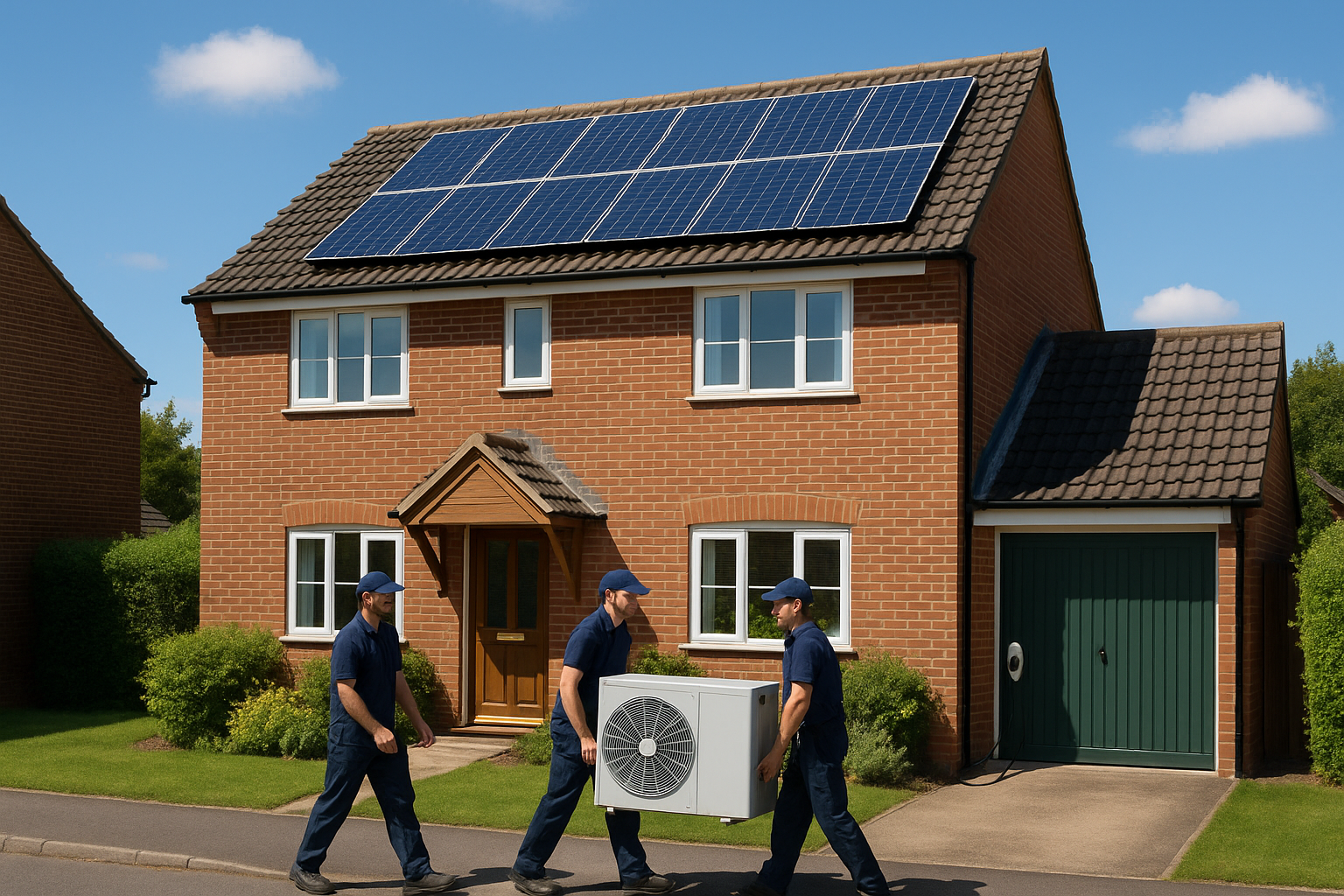Many homeowners are now exploring renewable heating options and wondering if solar power can offset the cost of installing a heat pump.
The short answer is yes — but only partially. Solar doesn’t pay for a heat pump outright, but it can significantly reduce the long-term running costs, making the overall investment more manageable.
Let’s break down how it works.
Get Help from the Government Grant
Thanks to the UK Government’s Boiler Upgrade Scheme, homeowners in England and Wales can claim up to £7,500 towards installing an air-source or ground-source heat pump.
Apply for the Boiler Upgrade Scheme here
This generous grant reduces the upfront cost substantially — but most households will still have to contribute several thousand pounds towards the total installation.
How Solar Panels Make a Difference
While the BUS grant helps you install your heat pump, solar panels help you run it more affordably.
Here’s how:
A heat pump runs on electricity. Solar panels let you generate some of that power for free.
The more solar energy you use directly, the less you buy from the grid — cutting your monthly energy bills.
You can store extra power in a solar battery, helping you use solar energy even when the sun isn’t shining.
Solar and heat pumps together can add value to your home and reduce your carbon footprint.
Remember: Solar Won’t Cover Everything
It’s important to be clear — solar helps, but it won’t cover the entire cost of running a heat pump.
That’s because:
Seasonal mismatch: Solar power peaks in summer, while heat pumps use the most electricity in winter.
Roof space: Most homes can’t fit enough panels to power 100% of their heating demand.
Separate incentives: The BUS grant applies to the heat pump, not to solar panels.
Still, using solar to supply even a portion of your heat pump’s electricity can make a noticeable impact on your bills.
The Combined Savings Picture
Here’s a simple breakdown of how combining solar and a heat pump adds up:
| Cost Element | Support / Benefit |
|---|---|
| Heat Pump Installation | Up to £7,500 off via the Boiler Upgrade Scheme |
| Solar Panel Installation | Separate investment — can reduce electricity bills |
| Running Costs | Reduced thanks to solar generation |
| Long-Term Savings | Lower energy bills, lower carbon footprint, potential property value boost |
Example utilising solar and battery storage, leveraging on charging at cheaper rate.
The table below shows a combined savings of £792 if you utilise energy from solar and battery storage charging at cheaper rate compared with peak rate.
| Scenario | Assumed Coverage | Annual HP kWh from Grid | Effective Unit Price | Annual Running Cost | Saving vs Baseline |
|---|---|---|---|---|---|
| Baseline (no solar, no battery) | 0% | 3,000 | 30.0p | £900 | — |
| A) Battery on cheap rate | 100% via battery | ~0 (battery supplies) | 11.1p | £333 | £567 |
| B) Solar contribution | 25% solar (750 kWh) | 2,250 | 30.0p | £675 | £225 |
Example only: Assumes annual heat demand 9,000 kWh (heat), heat pump SCOP 3.0, standard tariff £0.30/kWh, off-peak £0.10/kWh, battery round-trip efficiency 90% (effective ~11.1p/kWh), and 4 kWp solar PV covering ~25% of the heat pump’s annual electricity (seasonality applies). Actual performance and savings vary with property fabric, system sizing, tariffs, usage profile, and weather. Standing charges and export payments are excluded.
Together, solar and heat pumps create a sustainable, lower-cost heating system for your home — especially when paired with proper insulation and smart controls.
How UK Green Energy Installations Can Help
At UK Green Energy Installations, we specialise in helping homeowners make the most of renewable technology. Our team can:
Assess your home’s suitability for solar panels and heat pumps
Calculate your likely energy savings
Design a system that fits your budget and long-term goals
In Summary
Solar panels can’t completely pay for your heat pump — but they can help power it, reduce your running costs, and increase your savings when combined with the government’s £7,500 heat pump grant.
It’s a smart, sustainable step towards lower-carbon living — and one that’s already paying off for thousands of UK homeowners.
Ready to See How Much Solar Could Power Your Heat Pump?
Find out how much solar could contribute to your heat pump’s running costs.
Our expert team can assess your home’s energy use, roof potential, and system design to show you exactly how much of your heat pump’s electricity demand could be covered by solar energy.
FAQs: Solar and Heat Pumps
Can solar panels power a heat pump completely?
Not usually — most homes won’t generate enough solar electricity in winter to cover all heating demand, but solar can significantly reduce grid electricity use in spring and summer. A well-sized solar array can make a noticeable difference to your overall running costs.
Does the government grant apply to solar panels?
No, the Boiler Upgrade Scheme grant only covers the cost of installing a heat pump. Solar panels are a separate investment, but they work hand-in-hand with a heat pump to reduce your ongoing electricity costs.
Will I need a battery to make the most of solar and a heat pump?
A battery isn’t essential, but it helps maximise the use of your solar power. By storing excess energy generated during the day, you can run your heat pump overnight or when the sun isn’t shining — improving your self-consumption and reducing reliance on the grid.
How much could solar reduce my heating bills?
On average, solar panels might cover 20–30% of a heat pump’s annual electricity needs, depending on your roof, home size, and usage pattern. In our example above, that could save around £200–£300 per year compared with running entirely on grid electricity.
Can I still get the heat pump grant if I already have solar panels?
Yes. Having solar panels does not affect your eligibility for the Boiler Upgrade Scheme, as long as your installation meets the grant requirements and is carried out by an MCS-certified installer.


